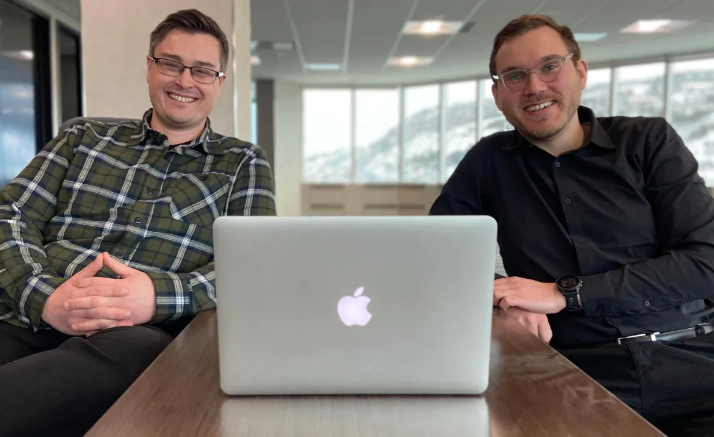Last May, things weren’t looking great for Clarke Oake.
Oake was laid off from his rotational job in Grand Prairie, Alta. as an electrical engineering technologist, working on heavy machinery in the oil and gas industry. Oake’s was one of nearly 24,000 jobs shed in Canada’s energy sector in the second quarter of 2020, due to a pandemic-related drop in energy demand, according to Statistics Canada.
But six months after getting a pink slip, Oake, 30, has transitioned to a new career in the Newfoundland and Labrador tech scene. He did so after retraining with Get Coding, a St. John’s-based company that aims to feed the growing appetite for jobs in the sector.
Oake was Get Coding’s first full-time student, and the first to get a job after finishing its program.
“It’s been absolutely crazy to go from not knowing anything about software development originally, and then they’ve taken me through the whole process of transferring my skill set and experience that I had previously into a new career,” Oake said.
At the end of January, after retraining with Get Coding, Oake landed a job as a software developer with PolyUnity, a medical manufacturing start-up in St. John’s.
“I didn’t even apply to the job at PolyUnity, they contacted me because of how tightly connected the network is here in the tech community,” said Oake.
The Department of Industry, Energy and Technology expects the estimated $1.6 billion tech industry to grow, and add more than 2,000 new jobs over the next three years in Newfoundland and Labrador.
The growth comes as the province’s oil industry suffers: according to the department, 5,300 people were directly employed by oil and gas at the end of 2020, compared to nearly 9,000 the year before.
Tailored training
The CEO of Get Coding sees a need for his program’s services as the province’s tech sector grows.
“Coding is a process of writing commands on your computer and making the computer show or do things in the way you want [it] to,” said Jan Mertlík, who has a degree in computer science from Memorial University, and runs Get Coding with his partner Sahand Seifi.
“It’s needed in every industry,” he said, adding there’s big demand for a host of jobs, such as front-end and back-end developers, software developers, and full stack developers in the province.
Get Coding tailors its program to each student, Mertlík said, by offering one-on-one training to help people learn the skills they need to get a job in tech.
In 2019, Mertlík and his business partner started holding in-person coding classes, with the first course an introduction to web development.
“We had a group of 10 students and we got them in a room and then we walked them through the process of building a website,” he said.
The classes exposed students to HTML, CSS and JavaScript — “the sort of foundational languages of the web,” he said — classes that were moved online after the pandemic hit.
In January, Mertlík said Get Coding had 13 students, but his class has now grown to 20. Before anyone begins the program, they assess students to identify their strengths and weaknesses.
“We get to understand what they know, what experiences they’ve had in the past, what skills they bring, what education they’ve had, what they like and what they don’t like. And then we work with them on establishing a goal,” he said.
The program takes six to 12 months to complete, depending on how much time people have to devote to their studies, and demand is strong, Mertlík said.
“We have students messaging us every day, trying to see if this is a fit for them or not.”
While Get Coding isn’t a formal college or university program, Mertlík said diplomas and certificates aren’t as important in the tech industry as elsewhere. What matters, he said, is practical hands-on experience, particularly since the languages used to write code rapidly evolve.
“We stay in touch with the local industry, making sure we know what technologies they’re using today, and we’re hoping to work with them in the future to make sure we know what technologies they’re going to be using in the future,” said Mertlík.
Meanwhile, Oake, who interviewed with a number of companies before landing his job, agrees with Mertlík’s approach. He said it’s an exciting time to start in the industry.
“There’s so many really cool companies here doing so many really cool things. And they desperately need people,” said Oake.
Mertlík said his vision is to build Get Coding into the centrepiece of Atlantic Canada’s tech industry.
“We have knowledge of the industry, know where the industry is going, and are able to take that knowledge and help the local workforce to learn those skills and help the tech industry grow,” he said.
“The only way how Atlantic Canada can ultimately succeed as a tech hub is if there is a very strong support when it comes to training and training the relevant skills.”
As for his first student getting hired, Mertlík said “it was just so exciting to see him learn so quickly. and keep his eye on the prize.”
Get Coding’s second student is close to finishing the program and will be searching for jobs in the coming weeks, he said.
According to The Department of Industry, Energy and Technology. there are approximately 165 companies and 4,000 employees in the province’s tech sector.
Reposted from cbc.ca
Original Source: https://www.cbc.ca/news/canada/newfoundland-labrador/get-coding-former-oil-worker-retrains-in-tech-1.5952164
